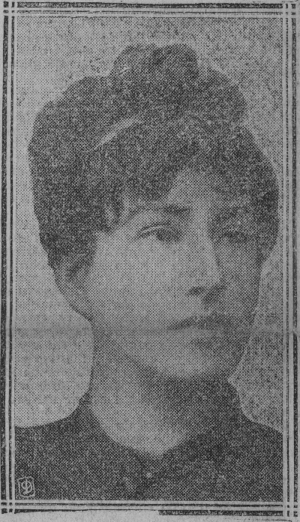Margarete Traube facts for kids
Margarete Traube (born June 4, 1856 – died December 11, 1912) was a smart scientist from Germany. She was a chemist, which means she studied how different things are made and how they react. She also hosted special gatherings called "salons" and was an early supporter of women's rights. Margarete lived most of her adult life in Italy.
Contents
Margarete Traube's Early Life and Education
Margarete Traube was born in Berlin, Germany. Her family had a strong background in science. Her father, Ludwig Traube, was a famous doctor. Her uncle, Moritz Traube, was a scientist who studied how chemicals work in living things. Her brother, also named Ludwig Traube, was a well-known expert in old languages.
In 1876, both of Margarete's parents passed away. The next year, when she was 21, she visited Rome, Italy. She was with a German writer named Fanny Lewald, who supported women's rights.
In 1878, Margarete decided to live in Italy for good. She joined the University of Rome. She studied natural sciences and graduated with high honors. She became a favorite student of Jacob Moleschott, a Dutch scientist who studied how living things work. He had actually been a student of her father's in Berlin.
Margarete's Marriages and Family Life
While at the university, Margarete met Franz Christian Boll again. He was a scientist who also studied how living things work. He had been one of her father's students too. Franz had moved to Italy to get better from a lung illness. In 1873, he became a professor at the University of Rome.
Margarete and Franz got married on March 12, 1879. Sadly, Franz died just ten months later, on December 19. After he passed away, Margarete worked hard to organize and publish his scientific papers in both Italian and German.
Later, she met Guglielmo Mengarini, an Italian engineer who later became a professor. They got married on August 18, 1884, in Zurich, Switzerland. They had four children together: Publio (born 1885), Cora (who died as a baby in 1886), Valeria (born 1889), and Fausta (born 1893). Fausta later became a sculptor.
Margarete and Guglielmo often traveled between their home in central Rome, called the Palazzo Mengarini, and their villa in Anzio.
Hosting Cultural Salons
Margarete's parents used to host special gatherings called "salons" in Germany. Margarete continued this tradition in Rome. These were exclusive cultural meetings where important people discussed new ideas. They talked about women's rights and humanism, which is a way of thinking that focuses on human values.
These salons had a big impact on Italian culture at the time. Famous people like Theodor Mommsen and her brother Ludwig Traube attended them.
Margarete Traube's Scientific Research
As a student, Margarete did her first research in the lab of Emil du Bois-Reymond, a physiologist. She even had to sit behind a curtain there! Later, she worked in the chemistry lab of Stefano Capranica. He had studied with her first husband, Franz Boll.
Margarete continued to study how animals' bodies work. She worked with physicist Pietro Blaserna. Then, she worked in the lab of Casimiro Manassei, where she studied how skin lets things pass through it.
She also worked with other scientists like Luigi Luciani and Angelo Celli. With her colleague Alberto Scala, she wrote several papers about their research. They studied the chemistry of colloids (tiny particles mixed in a liquid) and metal alloys (mixtures of metals).
Towards the end of her life, from 1911, Margarete worked in the chemistry lab of Emanuele Paternò. Besides her scientific work, Margarete also wrote many essays on philosophy, society, and geography. However, no printed copies of these essays are known to exist today.
Margarete Traube's Final Years
In 1912, Margarete became very ill with cancer. She traveled to Milan for a few months to try an experimental treatment. Even though she was sick, she kept doing research in the lab of Ettore Molinari while in Milan.
She returned to her home in Anzio, seeming to be better. But then she caught a bad case of the flu. Margarete Traube sadly died suddenly on December 11, 1912, at the age of 56.
Other projects
- Wikimedia Commons contains images or other files about Margarete Traube
 | Anna J. Cooper |
 | Mary McLeod Bethune |
 | Lillie Mae Bradford |


